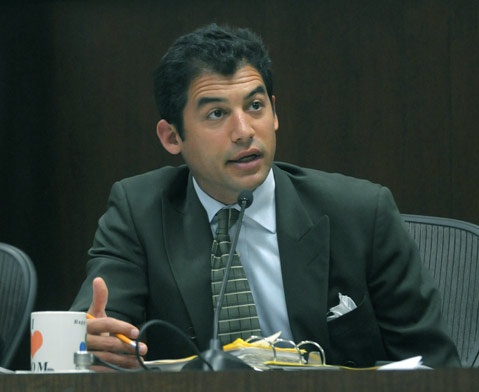Das Williams Proposes Strip Club Tax
Money Would Fund Programs for Sexual Assault Victims

Assemblymember Das Williams recently proposed legislation to tax certain California strip clubs at a rate of $10 per customer. The money would fund programs that treat victims of sexual assault and human trafficking, and help pay for forensic rape kits.
It would be up to the clubs to determine how they pay, whether by taking steps to increase profit (i.e., creating a cover charge, upping drink prices, etc.) or simply absorbing the cost. The tax, however, may not be passed to the entertainers, the bill says.
“There is a clear nexus between alcohol consumption and violence against women,” Williams said in an interview with The Sacramento Bee. “This [bill] only affects those that serve alcohol.” The two gentleman’s clubs in Santa Barbara County — the Spearmint Rhino locations in the City of Santa Barbara and Santa Maria — don’t serve booze and wouldn’t be affected.
Said the former Santa Barbara councilmember in a prepared statement, “There is a clear and urgent need for funding for effective delivery of services and care for women who have been sexually assaulted. To date,” he went on, “the precedent has been set by the Texas and Utah legislatures, and other states are examining this funding stream.” He explained that California rape crisis centers helped 29,929 victims in 2011, with the state’s General Fund contributing only $45,000, or around $1.50 per victim. While federal dollars previously paid for the bulk of these services, rape crisis providers recently took a 25 percent cut in national funding.
Williams’s camp has so far been unable to say how much money the proposed pole tax could generate. His staff is trying to figure out exactly how many strip clubs there are in the state and are challenged by the rules and regulations that differ from city to city, he said. “The precedent set in others states definitely is inspiration for this piece of legislation,” Williams said in an email to The Santa Barbara Independent. “However, the need for a funding source for rape crisis centers came to me from the local rape crisis center through their state organization, because they know my legislative background in fighting for women’s issues.” The bill needs a two-thirds majority approval in both houses of the California Legislature to pass.
Williams said he hasn’t heard from any club owners about his idea but said the bill shouldn’t be a big source of worry for them. “This is not a make-or-break tax for these businesses,” he said in the email. “Even in tough economic times, strip clubs are not hurting for money.” Club owners and operators in other states have challenged similar models of the “pole tax” in court, arguing it violate the clubs’ free-speech rights and seriously hurt their bottom lines.
Officially called the “Sexually Orientated Business Tax,” Williams’s bill, for its purposes, defines nude as either entirely unclothed or “clothed in a manner that leaves uncovered or visible through less than fully opaque clothing, any portion of the genitals or buttocks or, in the case of a female, any portion of the breasts below the top of the areola.” A sexually orientated business, it goes on, is a nightclub, bar, restaurant, or similar establishment that “provides for an audience of two or more individuals live nude entertainment or live nude performances.”



